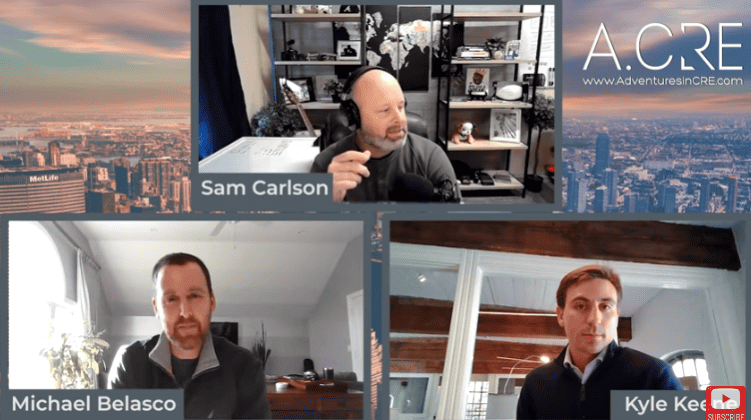Making the Transition from Employee to Real Estate Entrepreneur
In a recent A.CRE Audio Series episode, we dove into the story of a real estate professional who successfully transitioned from a traditional 9-to-5 role to launching their own venture. This is a common path many A.CRE readers have taken (or are looking to take). The episode offers an insider’s look at the challenges, triumphs, and indispensable lessons learned along the way that are applicable to many of you.
The story from the podcast episode encapsulates the essence of what it takes to pivot from being an employee to becoming a trailblazing entrepreneur. This transformation isn’t just about a change in job title or location; it’s about a seismic shift in mindset and strategy. And so, given that, we thought it would be valuable to dig deeper and unpack the nuanced elements that make such a transition successful.
- If you haven’t watched or listened to the episode, we highly recommend it. You can find it by clicking here. Make sure to also check out all of our A.CRE Audio Series episodes.
The Entrepreneurial Mindset Shift
In the recent episode of the Adventures in CRE podcast, Kyle Keene shared his transition from construction management in New York to real estate development in Greenville, South Carolina. This shift wasn’t merely a change in roles or locations; it was a transformation in mindset, especially regarding risk, time, and money.
Kyle discussed the importance of changing perspectives on these three factors. Initially absorbed in construction management, he had to step back and re-evaluate what he wanted to achieve. He deliberately chose to focus on one aspect of development first—construction management—to solidify his base. This knowledge gave him the confidence to navigate the riskier terrain of entrepreneurship. Kyle’s struggle with self-doubt, especially during the early mornings where deals seemed to crumble, resonates as a real-world example of the mindset shift required to succeed. His ability to persist through disappointments, and even learn from them, defines the entrepreneurial spirit.
Another crucial takeaway from Kyle’s story is the significance of local market understanding. He emphasized that what works in a fast-paced market like New York may not necessarily translate seamlessly into a market like Greenville. This is not merely a lesson in real estate strategy, but a broader commentary on the adaptability required when transitioning from an employee to an entrepreneur. You’re not just executing tasks on a list; you’re navigating a complex landscape that requires a nuanced understanding of various moving parts.
In short, transitioning from an employee to an entrepreneur in real estate isn’t just about accumulating knowledge or capital; it’s about fundamentally altering how you approach risk, time, and money. Kyle’s journey serves as a compelling example, showing that with the right mindset and adaptability, one can successfully make this transition.
Build Key Skill Sets and a Network
When you’re venturing into the entrepreneurial realm of real estate, as Kyle Keene vividly illustrated, the skills you acquire in your prior roles aren’t just resume fillers; they’re your arsenal. Kyle’s deep dive into construction management in New York wasn’t a detour but a foundational layer to his development career. The nuanced understanding of hard costs and the mechanics of construction became his unique selling proposition. In this business, you don’t need to be a jack-of-all-trades, but a master of one can get you far. This specialization can be your stepping stone, allowing you to fill gaps in your skill set through partnerships or hiring, as long as you’ve mastered one aspect deeply enough to bring unique value.
In an industry as multifaceted as real estate, networking is not merely schmoozing over cocktails but a vital exercise in resource amalgamation. Whether it’s finding a patient investor who understands the intricacies of real estate transactions or identifying local consultants in a new market, your network is a living, breathing extension of your capabilities. As Kyle’s experience outlines, networking isn’t just about accumulating contacts but about understanding and integrating into the business cultures of different markets. It can make the difference between a deal that falls apart and one that crosses the finish line.
In essence, your skills and network aren’t separate entities but symbiotic facets of your entrepreneurial self. One helps you establish your core competence, while the other amplifies it by connecting you with opportunities and resources that can fill in the gaps. The transition from employment to entrepreneurship in real estate is a calculated jump, facilitated by a strong skill set and an even stronger network.
Preparing to be a Real Estate Entrepreneur
Embarking on a real estate entrepreneurial journey is no casual feat—it’s a calculated risk. The podcast conversation with Kyle Keene sheds light on this complex transition. Here are the three key suggestions for preparing yourself:
Deep Dive into One Aspect: Kyle Keene’s journey indicates the importance of mastering one element of the real estate process. Whether it’s construction management, acquisitions, or underwriting, having a niche expertise can be your steppingstone. Specializing equips you with the practical know-how to make informed decisions, giving you a distinct edge.
The First Investor is Key: The podcast emphasizes the value of securing a patient and understanding investor, especially for your first deal. This doesn’t just mean someone who can write a check, but someone who understands the intricacies of real estate transactions. Your reputation is an intangible asset; manage it wisely from day one.
Understand Your Market: Understand the market you are entering—not just from a numbers perspective but from a cultural standpoint. As Kyle found out, New York’s fast-paced environment is a world apart from Greenville, South Carolina. Understanding how business is conducted in your chosen market can be as crucial as knowing what business to conduct.
Be Patient and Adaptable: Understand that not all deals will go through, and not every investor will see eye-to-eye with your vision. The ability to adapt to setbacks and be patient, especially when entering a new market, is crucial. It’s not just about the metrics but understanding local business culture and communication nuances.
Take it Slow and Be Cautious: When starting, your reputation is everything. Being conscientious about the deals you pursue and the capital you use (both yours and others’) is key. This involves everything from due diligence to effective communication with all stakeholders. One failure early in your entrepreneurial journey can mean the end of that journey.
Conclusion and Parting Tips
In summary, the journey to becoming a successful real estate entrepreneur is a complex interplay of skill, timing, and, perhaps most critically, adaptability. Mastering one aspect of the industry provides a solid foundation, but it’s your ability to adjust to setbacks and understand the nuances of each deal that sets you apart. Equally crucial is a focus on risk management. Your reputation is your most valuable asset; safeguard it by conducting rigorous due diligence and maintaining transparent communication with all stakeholders.
As we’ve gleaned from Kyle Keene’s experiences and insights, the road to entrepreneurial success in real estate is never a straight path. It’s filled with twists, turns, and valuable lessons. Whether you’re a seasoned investor or a budding entrepreneur, remember that patience and adaptability are your best allies. Be meticulous in your approach, but also be willing to pivot when needed. In this dynamic and ever-evolving industry, staying still is not an option; continuous learning and adaptability are the keys to long-term success.
Frequently Asked Questions about Making the Transition from Employee to Real Estate Entrepreneur
What mindset changes are necessary for real estate entrepreneurship?
Transitioning to entrepreneurship requires “a seismic shift in mindset,” especially regarding risk, time, and money. As Kyle Keene shared, it’s not just a job change—it’s “about fundamentally altering how you approach” these factors, including persisting through setbacks and embracing uncertainty.
Why is local market knowledge important?
Kyle emphasized that “what works in a fast-paced market like New York may not necessarily translate seamlessly into a market like Greenville.” Entrepreneurs must grasp not only the numbers but also “the cultural standpoint” of the market to navigate deals effectively.
How can specialization support entrepreneurial success?
Focusing on a single area—like Kyle did with construction management—provides a “foundational layer” and a unique edge. “You don’t need to be a jack-of-all-trades,” but having deep expertise in one area allows you to bring unique value and build from there.
Why is securing the right investor critical for your first deal?
Your first investor should be more than just a source of capital. The episode highlights the need for “a patient and understanding investor,” someone who appreciates the complexities of real estate transactions. This helps you build credibility and manage your reputation from day one.
How important is your professional reputation when starting out?
Your reputation is “an intangible asset.” Being cautious about the deals you pursue, and how you handle investor capital and communication, is essential. “One failure early…can mean the end of that journey,” so reputational risk management is critical.
What role does networking play in making the transition?
Networking is “a vital exercise in resource amalgamation,” not just socializing. Kyle’s experience shows that integrating into local business cultures and building trust with investors or consultants can determine whether a deal succeeds or fails.
How should new entrepreneurs handle setbacks?
The ability to “adapt to setbacks and be patient” is essential. Kyle’s story includes moments of early doubt and deals falling apart, but persistence and learning from failures “define the entrepreneurial spirit.”
What are the key preparations before launching your own venture?
Key steps include: mastering one part of the business, securing a reliable first investor, deeply understanding your market, and moving cautiously. These create a foundation for calculated risk-taking and long-term sustainability.
What’s the overall takeaway from Kyle Keene’s journey?
Kyle’s experience shows that “the road to entrepreneurial success in real estate is never a straight path.” The keys are adaptability, focus, market understanding, and protecting your reputation through diligence and communication.




